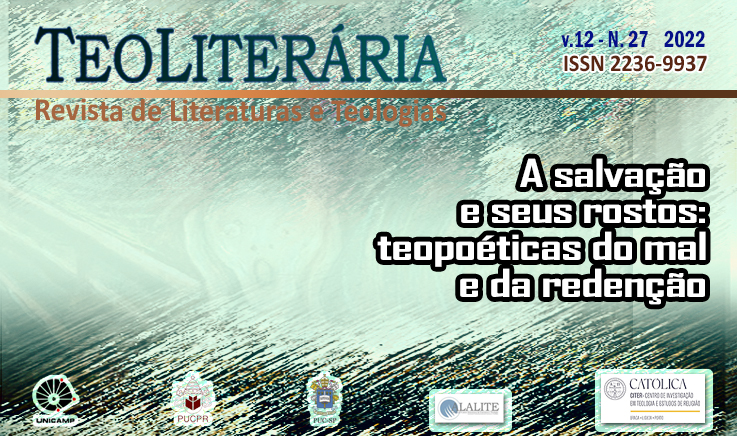Entre a maldade, bondade, ódio e salvação na obra Jane Eyre, de Charlotte Brontë
DOI :
https://doi.org/10.23925/2236-9937.2022v27p246-273Résumé
Jane Eyre, publicada originalmente em 1847, é considerada uma das principais obras de literatura inglesa, trazendo as narrativas da protagonista sobre os sofrimentos, violências e perdas que vivenciou até o encontro com a felicidade. Nesta obra, Charlotte, uma das celebradas irmãs Brontë, traz a possibilidade de problematizar sobre amor, bondade, ódio, redenção e sofrimentos, a partir do olhar da narradora-protagonista, que ficou órfã ainda jovem e traz sua fé como um fio condutor fundamental para compreender não apenas o universo narrativo, como também para refletir a respeito destas temáticas se relacionam com concepções práticas dos cristãos. A forma como ela enxerga o mundo e dialoga com as realidades que enfrenta deixa espaço para pensar as dinâmicas e paradoxos entre os discursos relativos a fé cristã e como ela é vivenciada no cotidiano por diferentes grupos e sujeitos. A vida de Jane traz para os leitores o desafio de pensar, a partir de uma obra literária, conceitos que adentram em diversas temporalidades e trazem reflexões que se estendem da literatura para a realidade social.
Références
ARIÈS, Philippe. História social da criança e da família. Trad. Dora Flaksman. 2. ed. Rio de Janeiro: LTC. 1981.
ALENCAR, José de. Lucíola. Porto Alegre: L&PM Pocket, 2018.
BERLIN, Isaiah. Uma mensagem para o século XXI. Belo Horizonte, Âyiné, 2016.
BRONTË, Charlotte. Jane Eyre. São Paulo: Mediafashion/Folha de São Paulo, 2017.
BURNETT, Frances Hodgson. O jardim secreto. São Paulo: Editora 34, 1993.
DELEUZE, Gilles; GUATARRI, Félix. Mil platôs: capitalismo e esquizofrenia – Vol. I. São Paulo: Editora 34, 1195.
DELUMEAU, Jean. História do medo no ocidente- 1300-1800. São Paulo: Compahia das Letras, 2009.
DUMAS FILHO, Alexandre. A dama das camélias. São Paulo: Saraiva, 1953.
EAGLETON, Terry. Como ler literatura. Porto Alegre: L&PM, 2020.
ECO, Umberto. Seis passeios pelos bosques da ficção. São Paulo: Companhia das Letras, 1994.
FIGUEIRA, Eulálio Avelino. Por uma superação da epistemologia tradicional no campo da religião a partir do pragmatismo de Richard Rorty. In: QUEIROZ, José; GUEDES, Maria Luiza; QUINTILIANO, Angela Maria Lucas. Religião, modernidade e pós-modernidade: interfaces, novos discursos e linguagens. Aparecida-SP: Ideias & Letras, 2012, p. 35-54.
FREYRE, Gilberto. Casa-grande & senzala: formação da família brasileira sob o regime da economia patriarcal. 49 ed. Ver. São Paulo: Global, 2004.
GALVÃO, Arthur Emanuel Ilharco. Terá a religião lugar no espaço público? O politeísmo utópico de Richard Rorty. In: QUEIROZ, José; GUEDES, Maria Luiza; QUINTILIANO, Angela Maria Lucas. Religião, modernidade e pós-modernidade: interfaces, novos discursos e linguagens. Aparecida-SP: Ideias & Letras, 2012, p. 179-204.
GODFREY, Esther. Jane Eyre, from governess to girl bride. Studies in English Literature, 1500-1900, vol. 45, n. 4, 2005: 853-871. Disponível em http://www.shirleymohr.com/JHU/Sample_Articles_JHUP/SEL_2005_45_4.pdf. Acesso em 08 mai. 2022.
GODINHO, Helder. Sobre a ausência. Cadernos do Ceil - Revista multidisciplinar sobre o imaginário. Lisboa/Portugal, n. 3, 2016. p. 21-28. Disponível em https://ielt.fcsh.unl.pt/sites/ielt/conteudo/cadernosceil/ficheiros/n3/CCEIL_2-3_2016_HG.pdf. Acesso em 06 jun. 2022.
GODOY, Edevilson de. O sacrifício de Cristo como superação do sacrifício antigo. Tese (Doutorado). São Paulo: Programa de Estudos Pós-Graduados em Teologia da Pontifícia Universidade Católica de São Paulo, 2009.
GONÇALVES, Paulo Sérgio Lopes. A experiência religiosa à luz da fenomenologia hermenêutica. In: GONÇALVES, Paulo Sérgio Lopes. Um olhar filosófico sobre a religião. Aparecida-SP: Ideias & Letras, 2012, p. 77-112.
GUNJEVIC, Boris. Rezai e observai: a subversão messiânica. In: ZIZEK, Slavoj; GUNJEVIC, Boris. O sofrimento de Deus – inversões do Apocalipse. Belo Horizonte: Autêntica, 2016, p. 203-226.
LEONEL, João. A leitura literária da Bíblia e sua construção para a espiritualidade cristã. Teoliterária, v. 10, n. 22, São Paulo, p. 11-30, 2020. Disponível em: https://revistas.pucsp.br/index.php/teoliteraria/article/view/46591. Acesso em 12 jun. 2022.
MANZATTO, Antônio. Em torno da questão da verdade. Horizonte, v. 10, n. 25, Belo Horizonte, 2012, p. 12-28. Disponível em: http://periodicos.pucminas.br/index.php/horizonte/article/view/P.2175-5841.2012v10n25p12. Acesso em 05 abr. 2021.
MARTINS DE SOUZA, César; CASTRO, Weverton. Não violência e sociedade em O reino de Deus está em vós, de Tolstói. Teoliterária, v. 11, n. 24, 2021: 475-500. Disponível em: https://revistas.pucsp.br/index.php/teoliteraria/article/view/50772/37999. Acesso em 07 jun. 22.
PORTER, Eleanor. Pollyanna. Cotia-SP: Pé das Letras, 2020.
RIES, Julien. O sentido do sagrado nas culturas e nas religiões. Aparecida-SP: Ideias & Letras, 2008.
SALLES, Walter. Paul Ricoeur e o significado hermenêutico da linguagem religiosa. In: GONÇALVES, Paulo Sérgio Lopes. Um olhar filosófico sobre a religião. Aparecida-SP: Ideias & Letras, 2012, p. 113-145.
SAYAO, Sandro Cozza. Entre a literatura e filosofia: pensar com Lévinas é pensar além. Teoliterária, v. 10, n. 22, 2020: 308-329. Disponível em: https://revistas.pucsp.br/index.php/teoliteraria/article/view/48900. Acesso em 04 abr. 2021.
VATTIMO, Gianni. Crer que se crê: é possível ser cristão apesar da Igreja? Petrópolis-RJ: Vozes, 2018.
ZIZEK, Slavoj. Apenas um Deus que sofre pode nos salvar. In: ZIZEK, Slavoj; GUNJEVIC, Boris. O sofrimento de Deus – inversões do Apocalipse. Belo Horizonte: Autêntica, 2016, p. 129-160.
ZIZEK, Slavoj. Violência – seis reflexões laterais. São Paulo: Boitempo, 2014.
Téléchargements
Publié-e
Comment citer
Numéro
Rubrique
Licence
© TEOLITERARIA - Revista de Literaturas e Teologias 2022

Cette œuvre est sous licence Creative Commons Attribution 4.0 International.
A TeoLiterária – Revista de Literaturas e Teologias é detentora dos direitos autorais de todos os artigos publicados por ela. A reprodução total dos textos em outras publicações, ou para qualquer outro fim, por quaisquer meios, requer autorização por escrito do editor. Reproduções parciais de artigos (resumo, abstract, mais de 500 palavras de texto, tabelas, figuras e outras ilustrações) deverão ter permissão por escrito do editor e dos autores.



